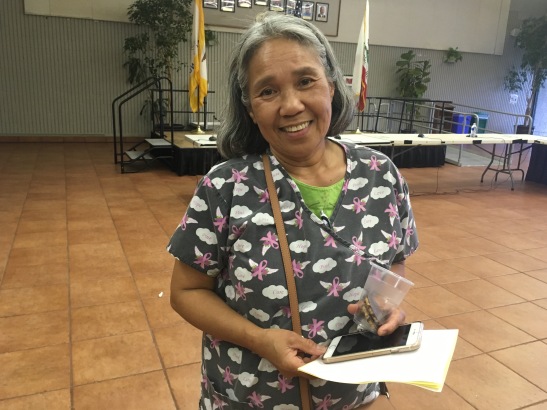Bay News Rising
Professional and college reporters training collaboratively for the future of Bay Area journalism. Bay News Rising is a project of the Pacific Media Workers Guild made possible by the labor and contributions of its members.
These workers say they can’t live on “living wage”
The apartment in South of Market was filthy and full of cockroaches, but Marlyn Tuliao came in anyway. Being a caregiver, she doesn’t choose where to work, but this time it was hard for her to even eat lunch.
Clad in a white protective suit from head to toe, she couldn’t breathe from the heat. Worse even, the smell in the apartment made her nauseous.
For working in vermin-infested apartments with all kinds of clients, Tuliao earns $13.64 per hour, 36 cents less than San Francisco’s minimum wage. But if a proposal working its way through the San Francisco Board of Supervisors is adopted, that wage could increase sharply.

Marlyn Tuliao came to the Town Hall meeting to share her experience working as a low-wage caregiver. Photo by Alena Naiden.
The board may vote this summer or fall on a measure to increase hourly wages by $2 this year and $1 more by July 2018 for 25,000 low-wage workers primarily employed by airport, home care and nonprofit contractors.
At a town meeting hosted by the Living Wage Coalition in late June, Tuliao and other workers made it clear that they’ve long needed a better income.
“All of you here tonight, what you do is important,” said Stacey Curtis, a home care worker. “You are important, and you deserve the right wage for your service.”
The city pays its employees and those of contractors doing work for the city, including some nonprofits and home care organizations, a “living wage” as set by San Francisco’s Minimum Compensation Ordinance.
Traditionally, the living wage is higher than the minimum wage by $1.86, said Willy Ramirez, who works for Living Wage Coalition. With the minimum wage increasing to $14 an hour, the living wage is falling behind.
“These are the business that are getting our tax dollars,” said Karl Kramer, campaign co-director for the coalition. “We want them to provide their best services, and to do that they need to retain the most experienced employees.”
The board’s budget committee will provide an estimate of the cost of amending the Minimum Compensation Ordinance to pay for the raises. When the numbers are crunched, the measure will be presented to the board, probably in September, said Bill Barnes, the legislative aide for Supervisor Jeff Sheehy.
The opposition was not apparent at the meeting, but there are concerns the amendment may be too costly.
“People don’t say don’t do this, people say this is gonna be expensive,” Barnes said.
The city recently passed its budget, which includes provisions setting salaries and allocations to nonprofits and contractors. It’s not clear if the budget can provide for a higher living wage.
However, if the proposal passes, the Living Wage Coalition expects the city to provide the funds for nonprofits to cover the raises for their workers. Nonprofits can also request a waiver from the ordinance, Kramer said.
“San Francisco is one of the wealthiest cities,” Barnes said. “We can definitely take care of those who work for the lowest wages.”
The raise was proposed by Supervisors Sheehy and Jane Kim and has been endorsed by a bevy of unions, including several locals of the Service Employees International Union, the labor councils of San Francisco and San Mateo County, United Food and Commercial Workers Local 5, Machinists District 141 and more.
At the town meeting, low-wage workers spoke about their financial needs and their hopes for a more stable future. Raising the living wage could allow some of them to reduce working hours and allow them to spend more time at home or to pursue additional education, they said.
“I’m sacrificing my family to work, and at the end it’s still not enough,” Curtis, the home care worker, told Bay News Rising.
Curtis has two children, 15 and 19, and she has never taken them on a family vacation. She said her long hours at work keep her from giving her children the support and supervision they need.

Stacey Curtis works for Homebridge and has hard time supporting her family with the money she earns. Photo by Alena Naiden.
If the pay increase is approved, it can help people like Curtis and Tuliao, said Jane Martin, a spokesperson for SEIU United Service Workers West.
“The city should take responsibility for its own workers and make sure they don’t live in poverty,” she said.
By Alena Naiden, Bay News Rising Staff Reporter


Recent Comments